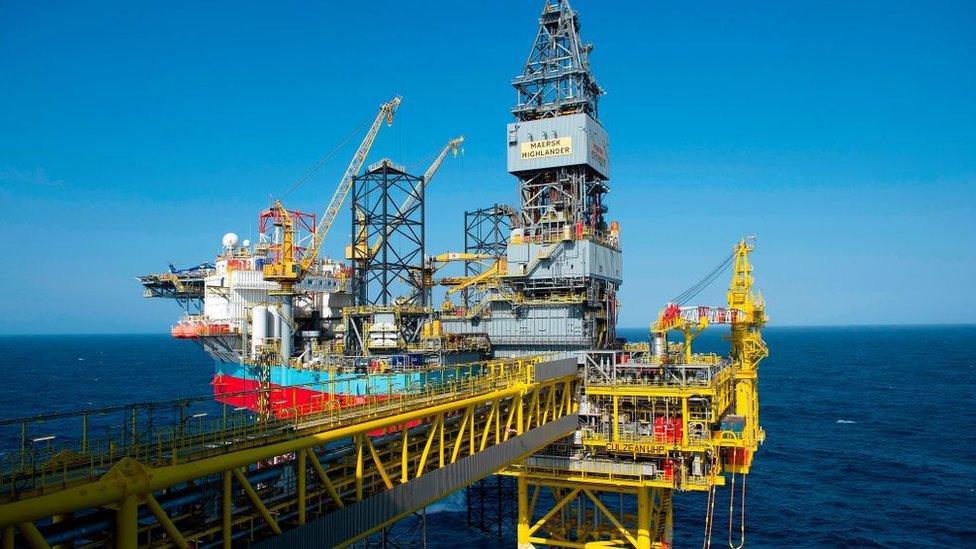Oil and gas profits windfall tax extended until 2029
- Published
- comments

Energy companies claim the windfall tax harms investment on the North Sea
The windfall tax on oil and gas firms has been extended by 12 months in Jeremy Hunt's Budget despite opposition from the Scottish Conservatives.
The 35% surcharge on profits due to high energy prices had been scheduled to end in March 2028.
Scottish Conservative leader Douglas Ross said he would not support the legislation needed to pass the extension.
He also urged the chancellor to reconsider the decision.
The Energy Profits Levy (EPL) was introduced by Rishi Sunak when he was chancellor in May 2022 as a way of funding help for households facing rising bills as energy prices soared following Russia's invasion of Ukraine.
The surcharge on the "extraordinary profits the oil and gas sector is making", external was initially set at 25% and raised an extra £2.6bn in tax revenues, external in its first year.
It was then extended and raised to 35% by Jeremy Hunt last November, taking the overall tax burden faced by UK oil and gas producers to about 75%.
Delivering his budget, Mr Hunt said: "Because the increase in energy prices caused by the Ukraine war is expected to last longer, so too will the sector's windfall profits - so I will extend the sunset on the Energy Profits Levy for an additional year to 2029, raising £1.5bn."
He said "generous investment allowances" would be retained to encourage firms to continue investing.
Douglas Ross says he will not support the legislation needed to pass the windfall tax extension
Mr Ross said he supported many "positive measures" in the budget, such as the 2p cut in national insurance and the freeze on alcohol duty which would help the Scotch whisky industry.
But he told BBC Scotland News: "I'm not going to hide my disappointment in the fact I urged the chancellor not to extend the windfall levy but that decision was taken to continue for it for a further year.
"I think that's the wrong choice, I think the chancellor took the wrong decision there. I made it clear to him that I won't support that when a bill that will be required in the House of Commons comes back."
On Tuesday, Mr Ross told BBC Scotland's Podlitical he had lobbied both the chancellor and the prime minister on the issue.
He said: "I've said it privately to the chancellor, to the prime minister, to senior ministers and I'm saying it publicly. I'm not trying to in any way run away from this.
"What we need for oil and gas companies is certainty going forward. A further extension doesn't provide that certainty."
The chancellor's announcement came just hours before the Scottish Conservatives held a debate in the Scottish Parliament condemning other parties for their "reckless assault" on the oil and gas industry.


This is awkward for the Scottish Conservatives.
The North East of Scotland is an area where they're banking on having some success in the upcoming general election. And they hoped that opposing tax measures hitting the oil and gas industry would help with that.
Moreover, Douglas Ross had made clear publicly that he'd been lobbying the chancellor on this very issue.
The Scottish Conservatives will now worry that this could dampen enthusiasm for the party in a key target region.
And on top of that, what does this say about their leader's ability to influence the top levels of the UK party? He went public with his pleas. They fell on deaf ears.
And to top it off, within hours of Jeremy Hunt's announcement, the Scottish Conservatives were debating their own motion at Holyrood which warned of the economic harms of…extending the windfall tax. You couldn't make it up.
You suspect they may not have lodged that motion on Monday if they'd know what the chancellor was about to do.
It looks like the Scottish Conservatives plan to tough this out: they're going to make clear they disagree with this particular budget measure.
But some will be feeling ignored by the UK party.

Industry body Offshore Energies UK (OEUK) said the extension risked investment, jobs and growth.
OEUK chief executive David Whitehouse said: "The industry is being taxed on windfall profits which no longer exist and facing a fourth round of fiscal change and turmoil in less than two years, making it impossible to plan investment for the energy transition and the path to net zero."
Scottish Secretary Alister Jack dismissed the concerns, saying he did not believe extending the levy for another year would have any impact on jobs.
He said: "Thanks to Putin's behaviour, the prices have gone up enormously and the profits have gone up exponentially.
"Therefore some of that needs to come back to support the government in helping families and improving public services."
But UK government energy minister Andrew Bowie, the Conservative MP for West Aberdeenshire and Kincardine, said he agreed with Douglas Ross that the extension was "deeply disappointing" and said he would be "working with him to resolve this".
Aberdeen & Grampian Chamber of Commerce also criticised the extension, calling it the "fourth Tory tax raid on the North Sea in two years" and predicting the levy would make the sector more uncertain.
Policy director Ryan Crighton said: "We need investment in new North Sea oil and gas fields to maintain jobs and offset declining production. Without that investment, production could halve by 2030, which places thousands - perhaps tens of thousands - of jobs at risk.
"We are already seeing investors walking away from deals - with some showing open dissent towards the UK - and if that gathers pace, then the 1,000 jobs we have already lost to the windfall tax could be a drop in the ocean compared to what is to come."
A windfall tax is used to target firms which benefit from something for which they were not responsible.
Labour has proposed increasing it to 38%, taking the overall tax rate to 78%, while the SNP wants it maintained at the current level.
The Treasury has promised to scrap the tax if prices fall to normal levels for a sustained period, which would see the tax rate on energy firms fall to 40% .
Related topics
- Published22 October 2024
